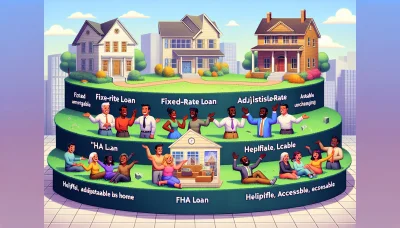Can i get a loan for a down payment Quiz
Test Your Knowledge
Question of
Understanding Down Payment Loans
-
Types of Down Payment Assistance
- Government-Backed Programs
- Non-Profit and Community-Based Initiatives
- Employer-Assisted Housing Benefits
-
Eligibility Criteria for Down Payment Loans
- Credit Score Requirements
- Income and Debt-to-Income Ratio
- First-Time Homebuyer Status
Exploring Real Estate Financing Options
Conventional Mortgage Loans
-
Fixed-Rate vs. Adjustable-Rate Mortgages
- Fixed-Rate Mortgages offer the security of the same interest rate and monthly payments throughout the life of the loan.
- Adjustable-Rate Mortgages (ARMs) have an interest rate that may change periodically depending on changes in a corresponding financial index that's associated with the loan.
-
Private Mortgage Insurance (PMI) Implications
PMI is required for buyers who make a down payment that's less than 20% of the home's purchase price. It protects lenders in case the borrower defaults on the loan.
-
Loan-to-Value Ratio Considerations
The Loan-to-Value (LTV) ratio is a critical factor lenders use to assess the risk of a loan. It's calculated by dividing the mortgage amount by the appraised property value.
Alternative Financing Solutions
-
Seller Financing
In seller financing, the seller acts as the lender, allowing the buyer to make payments directly to them under agreed-upon terms rather than borrowing from a bank.
-
Lease-to-Own Agreements
A lease-to-own agreement allows a renter to buy the property they are renting, typically after a certain period of time, under specific conditions laid out in the agreement.
-
Hard Money Loans
Hard money loans are short-term loans from private investors or companies, based on the property being used as collateral. These are often used by investors looking to renovate and flip properties quickly.
The Role of Credit in Securing a Loan
Building a Strong Credit Profile
- Importance of Credit History
- Tips for Improving Credit Scores
- Impact of Credit Inquiries on Loan Approval
Your credit history is a vital component of your financial profile, showcasing your reliability in repaying debts. It significantly influences lenders' decisions.
Improving your credit score involves timely bill payments, reducing outstanding debt, and avoiding new debt. Consistent, responsible financial behavior boosts your creditworthiness.
Hard inquiries from lenders can temporarily lower your credit score. However, shopping for the best rates within a short period is typically treated as a single inquiry.
Understanding Credit Report Analysis
- Reading and Interpreting Your Credit Report
- Identifying and Disputing Errors
- The Effect of Credit Utilization on Loan Terms
Your credit report contains detailed information about your credit history, including accounts, payment history, and outstanding debts. Understanding it is crucial for managing your financial health.
Regularly review your credit report for inaccuracies. Dispute any errors promptly to ensure your report accurately reflects your credit history.
Credit utilization, the ratio of your credit card balances to their limits, affects your credit score. Lower utilization rates can lead to better loan terms, including lower interest rates.
Preparing for the Loan Application Process
-
Gathering Necessary Documentation
- Proof of Income and Employment Verification
- Asset Documentation and Verification of Funds
- Legal Documentation and Identification Needs
-
Navigating the Loan Approval Timeline
- Pre-Approval vs. Pre-Qualification Stages
- The Underwriting Process Explained
- Closing Procedures and Finalizing the Loan
Managing Down Payment Loan Repayment
Structuring Your Repayment Plan
- Understanding Amortization Schedules
- Balloon Payments and Refinancing Options
- Strategies for Early Repayment without Penalties
Dealing with Financial Challenges
- Handling Loan Default and Foreclosure Risks
- Loan Modification and Restructuring Options
- Seeking Assistance from Housing Counselors
Investing in Real Estate Wisely
-
Assessing Property Value and Potential
- Conducting Market Analysis and Research
- Evaluating Location and Long-Term Growth Prospects
- Inspecting Property Condition and Estimating Repairs
-
Legal and Tax Implications of Property Ownership
- Understanding Property Taxes and Deductions
- Navigating Zoning Laws and Building Regulations
- Estate Planning and Inheritance Considerations












